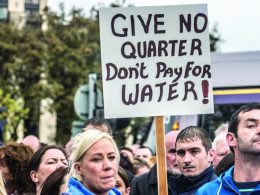The Campaign Against Household and Water Taxes is one of the most significant developments of recent years. Combined in particular with the workers occupations that have taken place (Vita Cortex in Cork is still ongoing), it indicates the emergence of new resistance from below.
Up to 20,000 people have attended public meetings to establish active campaign groups. Meetings and activities have taken place in every county and the movement is being spread from major towns to villages. The campaign has produced and distributed 470,000 leaflets and over 250,000 newsletters.
The National Day of Action on Saturday 18 February was followed up by an extremely significant National Day of Protest on 25 February with more than 40 protests taking place around the country – 500 in Limerick; 100 in Balbriggan; 1000 in Enniscorthy; 200 in Bray; 800 in Cork, 300 each in Newbridge, Carlow and Kilkenny, to name but a few.
To be able to achieve such a spread of action in just the second month of the tax is unprecedented.
The numbers of those who register for the tax will increase in the course of March, but the slowness of registration and the extremely large numbers boycotting shows the anger that exists in society and the enormous potential influence of the campaign. After years of having austerity rammed down their throats, ordinary working class people seem to have found an issue and a vehicle to fight austerity.
One hundred years ago New Unionism swept Ireland, when unorganised general workers and the most oppressed got organised from below and built their own organisations, new trade unions and a new party, the Irish Labour Party.
Given that destruction of living standards is the only policy promised for the foreseeable future, the struggle against this robbery can be a catalyst not only for a fight back but for the emergence of new fighting organisations and even a new party that really represents working class people.
The United Left Alliance was established to push forward the idea and the plans and preparation for a new party for the working class. It is vital that the ULA recognise the potential political significance of the Household Tax campaign.
When the ULA was launched we all hoped that it would have an impact in the general election and in turn would become an active focal point for people to get organised around.
Notwithstanding that we got five TDs elected, the propaganda offensive about burning bondholders and economic collapse, the trade union sell-out and the “hoping against hope” that the new Government might be different, actually meant that the mood to get actively involved in politics dipped in 2011.
However, in recent months, as the government’s honeymoon has ended things have begun to open up and the ULA has improved its profile through it’s Dail interventions. Fighting on the key issues can attract the best people towards the ULA but growth is never automatic.
ULA public representatives and all members, as well as highlighting and fighting on issues, need to specifically put forward the arguments for a new party for the working class more than we have. Linked to that, establishing the necessity for left and socialist policies also establishes the necessity for a new party.
Rather than hoping or just expecting that the ULA will develop, these essential political points need to be pursued and explained.
In the immediate weeks ahead the ULA will be organising public meetings that link the fight against the Household Tax and austerity to the need for a new party and a left alternative. But ULA members mustn’t just try to build the ULA through the Household Tax. All ULA members should genuinely build the Household Tax campaign, particularly in the run up to the 31 March registration deadline.
There isn’t a false division where the campaign is the arena for struggle and the ULA is its political reflection. The reality is that the Household Tax issue is very political and the campaign itself also needs to be political.
This is about the bondholders and austerity. It’s also about the future of working class people and the need for a fundamental shift in policy where the economy is organised for peoples needs not for speculators and bankers.
False limitations shouldn’t be placed on what the Household Tax campaign can become or what it could spawn. Politics and economics are crashing into the campaign from all sides because this unjust tax is rooted in the crisis in society and can’t be avoided. It clearly has the potential to involve thousands of people in political activity, in fact it already has.
For example, the campaign is the single biggest challenge to the austerity consensus so far and it clearly has a vested interest in helping to fight the Austerity Treaty in the referendum.
Some in the campaign may say that discussing the possibility of taking a more developed political position like this would be dangerous, that it might alienate some of the broad support that it has. But given people’s understanding of the crisis and the mood expressed at meetings, there is no reason to think that a majority wouldn’t accept the need to also fight against the Austerity Treaty.
All members of the ULA should get fully active in building for the series of public meetings taking place over the next weeks and to build the ULA in the run up to its conference in the Gresham Hotel, Dublin on 28 April.
The emergence of the Campaign Against Household and Water Taxes and the numbers it is mobilising and involving in activity should be a real boost to all. There is real reason to believe that the future activists for a new mass workers party are being forged in this and other struggles that are emerging.












